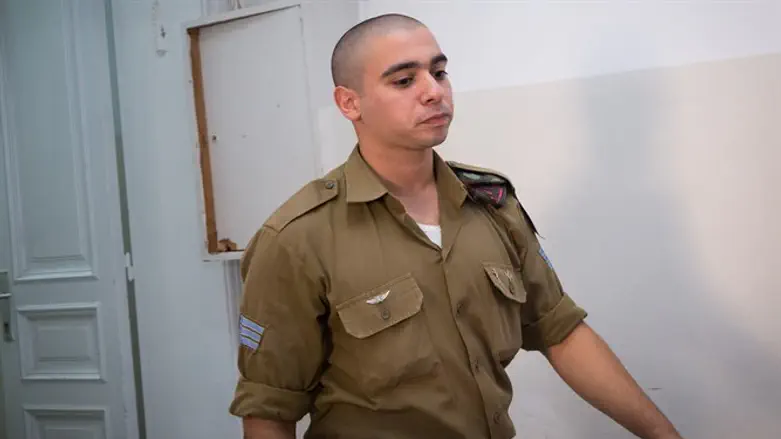
On Monday, Major-General (res.) and former IDF Deputy Chief of Staff Uzi Dayan, who also headed the National Security Council, took the witness stand in Elor Azariya's court case, as a witness for the defense.
Elor Azariya, an IDF soldier, is currently on trial for manslaughter after shooting a wounded Arab terrorist in Hevron in March. The soldier claimed he feared the terrorist, who was dressed too warmly for the weather that day, was hiding explosives under his clothes.
The defense submitted Dayan's opinion, in writing, to the military court, and immediately afterwards, the prosecution began their cross-examination.
At the beginning of his testimony, Dayan claimed that Azaria's case should not have been investigated by the military police investigator, since they do not have the tools to investigate an operational event.
The former Deputy Chief of Staff said, "Elor Azariya's rights to a presumption of innocence have clearly been trampled on. We are a law-abiding country. I don't know if Azariya committed a crime or not, and I am not interested in dealing with the question of what happened there."
"I submitted my opinion because I am concerned about what is happening, and about what will happen in the future. I am concerned about how this [incident] affects soldiers on the ground, and how it harms the IDF. Every day like this that passes, causes great harm to the IDF," Dayan emphasized.
The prosecution, Attorney Nadav Weisman, interrogated Dayan regarding this claim that as general commanding officer (GOC), he did not allow the military police investigator to investigate incidents before a military debriefing was held. The prosecution argued that Dayan had, in fact, allowed the military police investigator to open an investigation immediately following an event in Tarqumiya.
Dayan responded that events should not unfold this way, but [it is correct] that the authority to order an investigation is in the hands of the MIlitary Advocate General.
Regarding the military debriefing of Azariya's case, and the fact that Azariya himself did not participate in the debriefing, Dayan said, "If this is true, it casts a shadow on the debriefing. This is relevant, because it raises the question of how the case ended up in a criminal court."
According to Dayan, "Even if a soldier made a mistake, we do not take him to criminal court, unless there is a good reason to do so. A good reason? Proof that he acted with malicious intent."
Later, Dayan asked that the case be closed, and a plea bargain be struck with Azariya.
"It's not too late to make a plea bargain. The damage that will be caused to both sides if this case is continued, will be even greater than what has been caused until now," he said.
In response to questioning, Dayan explained that he had given orders to shoot terrorists, even when they did not pose an immediate threat.
"If you [were to] ask me if terrorists should be sentenced to death - [then the answer is] yes," Dayan concluded.